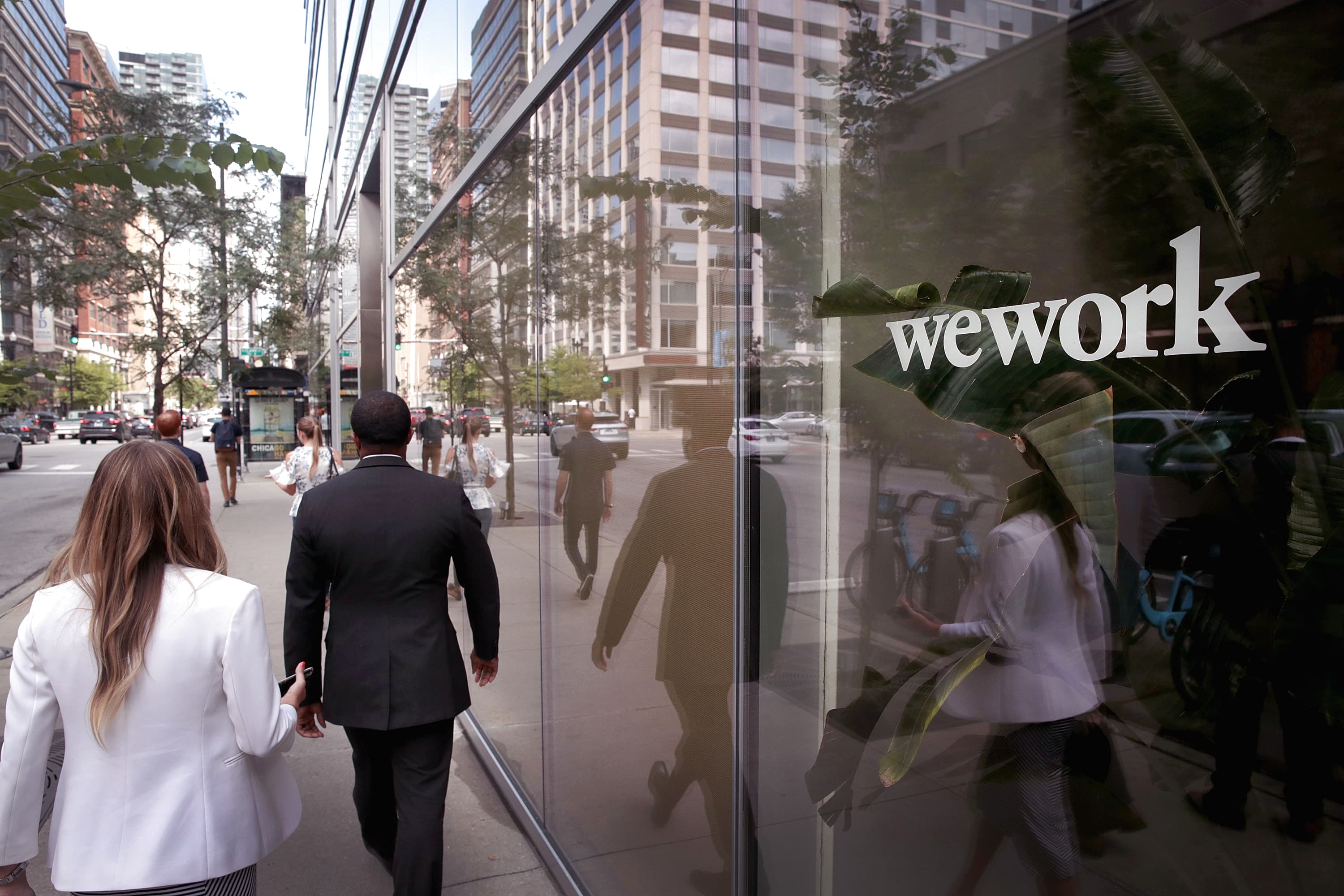WeWork board's special committee is demanding that SoftBank follow through with investment

A sign marks the location of a WeWork office facility on August 14, 2019 in Chicago, Illinois.
Scott Olson | Getty Images News | Getty Images
Five months after SoftBank agreed to a massive bailout of office-sharing start-up WeWork, a big part of the deal is in jeopardy of falling apart. A special committee to WeWork's board is now trying to ensure that SoftBank doesn't walk away.
In an emailed statement on Sunday, public relations firm Joele Frank said, "the Special Committee of the WeWork Board of Directors remains committed to taking all necessary actions to ensure that the tender offer which SoftBank has promised to our employees and shareholders is completed."
Last week, reports surfaced that SoftBank may be backing off a $3 billion tender offer for WeWork shares, as SoftBank's struggles with its Vision Fund are exacerbated by recent the market downturn. That commitment was part of a larger package, along with a $1.5 billion acceleration of equity it already promised and $5 billion in syndicated debt. WeWork needs the fresh cash after the company's IPO fell apart last year.
SoftBank still plans to extend $5 billion in debt to WeWork, people familiar with matter told CNBC last week. The special committee wants to ensure that employee shares get purchased as well. The biggest single recipient in the payout would be co-founder and ex-CEO Adam Neumann, who was ousted after the board lost confidence in his ability to mange the company.
"SoftBank has made numerous assurances to employees, and reneging on the agreement would be completely unethical, especially given the current environment," the statement said. "The Special Committee continues to believe that completing the tender offer is fair and in the best interest of the Company, its stockholders and all WeWork shareholders, including our employees and former employees."
It's an awkward situation considering that the agreement gave SoftBank 80% control over WeWork and designated Marcelo Claure, SoftBank's operating chief, as WeWork's executive chairman.
Claure is not on the special committee, which consists of early investor Bruce Dunlevie of Benchmark and Lew Frankfort, former CEO of handbag maker Coach.
SoftBank responded in a statement, saying that it "continues to honor its obligations" under the agreement and that WeWork hasn't satisfied all the conditions required for the deal to close. Still, SoftBank says it's provided over $5 billion in capital to WeWork since October.
"The main beneficiaries of the tender are Adam Neumann, large institutional investors, and some prior officers of the Company," SoftBank said. "Current WeWork employees have already benefited greatly from the repricing of their options in an earlier phase of the tender offer and would receive less than 10 percent of the proceeds in the tender offer."
Here is the full memo sent out on Sunday by the special committee:
"The Special Committee of the WeWork Board of Directors remains committed to taking all necessary actions to ensure that the tender offer which SoftBank has promised to our employees and shareholders is completed. Not only is SoftBank obligated to consummate the tender offer as detailed by the Master Transaction Agreement, but its excuses for not trying to close are inappropriate and dishonest. Further, SoftBank has made numerous assurances to employees, and reneging on the agreement would be completely unethical, especially given the current environment. The Special Committee continues to believe that completing the tender offer is fair and in the best interest of the Company, its stockholders and all WeWork shareholders, including our employees and former employees."
Here is SoftBank's full response:
"SoftBank continues to honor its obligations under the Master Transaction Agreement. SoftBank has provided over $5 billion in working capital to WeWork since October. The tender offer has no impact on SoftBank's commitment to WeWork or on the financial strength of the business. In October, all parties agreed to specific closing conditions to protect SoftBank. SoftBank has informed stockholders that all of the agreed upon closing conditions must be satisfied before the tender offer can be completed. As of now, they are not. The main beneficiaries of the tender are Adam Neumann, large institutional investors, and some prior officers of the Company. Current WeWork employees have already benefited greatly from the repricing of their options in an earlier phase of the tender offer and would receive less than 10 percent of the proceeds in the tender offer."
— CNBC's Alex Sherman contributed to this report
WATCH: SoftBank backs away from part of planned WeWork bailout
Read More
No comments